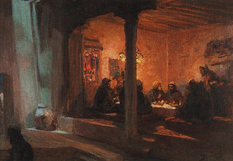 Sometimes chapter divisions can detour from hearing what the author of a biblical text has said. This is so true of 1 Corinthians 13. Most, at least from all the sermons I have heard and the weddings I have attended attest. Nonetheless, chapter 12 and chapter 13 of 1 Corinthians are in need of being heard together as if there is no chapter division between them. In fact, there is a bookend link between 12:13 and 13:13: ζηλοῦτε δὲ τὰ χαρίσματα τὰ μείζονα (12:31a) μείζων δὲ τούτων ἡ ἀγάπη (13:13b) Even those who don’t know New Testament Greek can see it––you can see the word “greater” (μείζονα, 12:31a / μείζων, 13:13b) at the close of chapter 12 and the close of chapter 13. Different endings (like Spanish), of course, but the same word: μέγας (great/greater) in 12:31a and 13:13b. The NASB, as do other translations, offers what I think is a much better read than the ESV: “But earnestly desire the greater gifts” (12:31a, NASB) Don’t know why the ESV translates the word μέγας as “higher.” I suppose it could, but this doesn’t help the English reader. The mistranslation masks the bookends here, which, in turn, masks the dynamic relationship between 1 Corinthians 12 and 13–these two chapters need to be read as one. So you can see (and hear) what Paul has crafted (with my more word for word translation):
So what does this do for us as we read chapters 12 and 13 together? First, we take and read the two as one thread and not separate chapter 13 as if it is a stand-alone-text about the vague notion of “love.” Witnessed by the mistaken use of the “Love Chapter” during weddings. Chapter 12 is most certainly about church, so for Paul, chapter 13 is about church as well. Second, we just had a chapter (12) on the one body of Christ—and please understand Paul is specifically referring to local churches, meeting in someone’s home, thus, “To the church of God that is in Corinth,” 1:2a): one body, many members (cf. 12:12, 27). Paul begins with the spiritual gifts (12:1), to which he will return in chapter 14, but makes a turn toward people-related gifting at the end of our chapter 12: apostles, prophets, teachers, those that do miraculous gifts of healing, helping, administering, and of course tongues.
Yep. Everyone wants these powerful, status-granting, attention-centered spiritual gifts (let’s be honest). Thus, the need for chapter 13. So, Paul asks,
Yet, he says there is a better way, a more excellent way. Paul then concludes our chapter 12:
Then, Paul instructs his readers/listeners on this more excellent way:
Let’s read 12:27–13:3 as one thread, of course with my interpretative spin (but I think it’s there in Paul’s meaning, a fair reading):
Well, this is a radical thing we have going on here. A new community built on the Love, not status, education, bloodlines, abilities, usefulness, or even spiritual office or gifting. And, then the reader/listener has Paul’s final charge: “So now faith, hope, and love abide, these three; but the greatest of these is love” (13:13).
0 Comments
When you come together as a church, 2: The seriousness of the Table (1 Corinthians 11:27-34)1/25/2020  The Lord's Supper, starting with the first gathered believers in Acts, was no ordinary meal . . . in other words, it wasn't a supper like the Roman suppers where men gathered to show off, to show respect to those who could be leveraged to give them social status, where boys, girls, men, and women were abused for the sake of the pleasures of men (do I have to spell it out for you?) . . . no, this meal, instigated by our Lord, created something new, a new humanity, a place of welcome, love, and acceptance . . . where unequals and strangers became family, the family of God This was and is no ordinary meal, the space where the gospel happened and was on display . . . it was at this meal where the gospel was demonstrated to be credible . . . This is why Paul was so very serious about approaching the Lord's Supper rightly . . . so much so that to approach it lightly was to incite judgment . . . while all are welcome at the Table, don't mess with the meal for it is no ordinary meal . . . Again . . .
 This Sunday as CPC in The Hill gathers for worship, instruction, and fellowship, we begin following along the theme “When Church Gathers at the Table.” We start with 1 Corinthians 10-11, a message entitle, “When you come together as a church . . .” (based on the thread of Paul’s words and phrasing in 1 Corinthians 11:17-34). Obviously, then, we will be focusing in the meaning and purpose of our gathering, and in particular, the Lord’s Supper, communion, the Table. One thing that I have found that has been overlooked in applying the significance of Paul’s instructions concerning the Table is the fuller context of 1 Corinthians, especially chapters 10-13 (yes, the follow up message is on 1 Corinthians 13 the next Sunday). Paul’s concern for how those at the table were treating others that were apart of the Table fellowship is the major issue surrounding the passage on the Lord’s Supper. As we should take the whole context as a guide for understanding what’s happened at the table in Corinth, we see clues in 1 Corinthians 10:17 and vv. 23-24: “Because there is one bread, we who are many are one body, for we all partake of the one bread” (10:17). Giving the wider context, “his neighbor” are those around the table. And based on 10:17, they are all are to be considered one body around that table. While I’ll discuss the actual experience—i.e., what was happening around that table—the situation was serious enough for Paul to pull in judgement language to raise the level of seriousness of the issue: Some at the table were not seeking the good and well-being of others at the table. That’s the context. “For anyone who eats and drinks without discerning the body eats and drinks judgment on himself. That is why many of you are weak and ill, and some have died. But if we judged ourselves truly, we would not be judged. But when we are judged by the Lord, we are disciplined so that we may not be condemned along with the world” (11:29-32). While we often read this as if Paul is speaking of some personal sin the individual is committing, the context is clear that we should infer he is referring to how some members were treating other members at that Table. This is what puts the gospel in jeopardy. This is what makes the gospel unbelieved by those watching the church. For by sharing in the Lord’s Supper, we are (supposed to be) proclaiming the Lord’s death until He comes (11:26). I leave you with a quote from Rae Murray . . . and you’ll just have to join us on Sunday to get the fuller picture of what God wants us to learn around the Table . . . “It is in the local congregation that the credibility of the gospel becomes apparent, for that is the place where a real community of men and women, of young and old, of stranger and friend, are gathered into the reconciled fellowship of the body of Christ, hear the declaration that their sins are forgiven, and feast together at the table of the Lord” (Rae Murray).
|
AuthorChip M. Anderson, advocate for biblical social action; pastor of an urban church plant in the Hill neighborhood of New Haven, CT; husband, father, author, former Greek & NT professor; and, 19 years involved with social action. Archives
February 2024
Categories
All
|
Pages |
More Pages |
|
 RSS Feed
RSS Feed